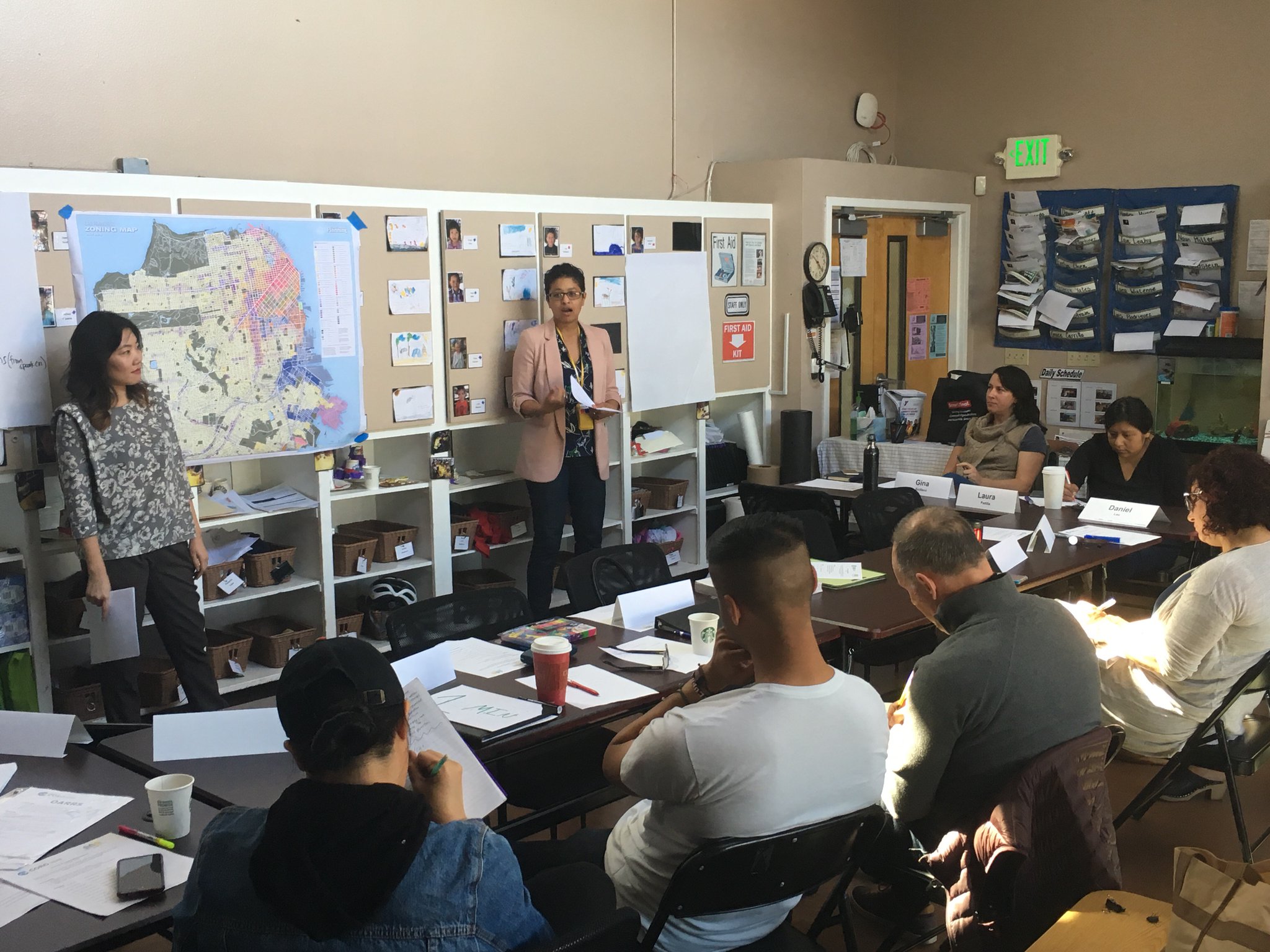NEN Leadership Academy

San Francisco is going through one of the most intense periods of transformation in its history. Socially, economically and physically, the City’s neighborhoods are changing overnight at a rate that many residents feel is unmanageable. The stress of this process, and the inevitable churn rate of key community stakeholders, has created a climate that engenders disempowerment and mistrust. The net result are neighborhoods that have a reduced capacity to assume their role as equitable partners in the work of making smart short – and long- term investments to preserve and protect the health of their residents and communities at large.
Healthy and resilient communities need involved, active and effective grassroots organizations. Those organizations need trained leaders. The NEN Leadership Academy provides current and emerging leaders with the training and connections needed to sustainably support resilient communities.

What is the NEN Leadership Academy?
The NEN Leadership Academy is a group-learning experience for cohorts of up to 20 community leaders. Participants meet over four months on four full-day Saturdays and four evenings. Program facilitators from CORO provide guidance and create experiences equipping participants with:
Skills: To empower diverse, emerging community leaders with tools and skills to create high-performing volunteer teams that identify and achieve collective goals
Knowledge: To grow participant understanding of SF programs, processes and services that can help catalyze positive change
Trust: To increase the level of trust and reciprocity between neighborhood leaders and the agencies and institutions committed to their success to ensure mutual accountability
Networks: To cultivate a thriving network of San Francisco stewards that work across neighborhood and interest-group boundaries
The NEN Leadership Academy’s Audience
The NEN Leadership Academy’s curriculum will be designed to meet the leadership development goals of current and emerging leaders who are committed to building strong and effective neighborhood based organizations that can steward their community on a sustained basis. The 18-month pilot program will serve three cohorts of approximately 20 people each:
- Community-based: A community-wide cohort with participants from across the City
- Place-based: A district-specific cohort
- Affinity-based: A cohort made up of representatives of Communities of Faith


The NEN Leadership Academy Model
The Academy follows CORO’s 70-year model of developing diverse leaders to work together across differences to create solutions for the common good. The model includes:
Seminars and Focus Days: Seminars focus on building skills in a team setting and focus days provide understanding of city departments, people and processes
Leader Interviews: Participants interview San Francisco department leaders and elected officials to establish relationships and understanding
Community Clinics: Seminars include opportunities to share experiences, insights and advice in a confidential peer coaching setting
Our Partnership with CORO
For 70+ years, Coro has helped thousands of participants build culturally competent, collaborative and results oriented leadership skills. Our learning model emphasis Individuals of diverse backgrounds examine and engage in real-world community leadership challenges, interview actual leaders, and are given activities to stimulate discussions and self-governance. The methodology empowers participants to take responsibility for their own learning. CORO facilitators are experienced at working with a diverse array of learners which include high school and community college students, early-career professionals, community and nonprofit leaders, teachers and academic leaders, farm workers, and government managers.

Mission
The creation of a Leadership Academy was a goal seeded in the NEN from its inception.
The three primary development drivers have been:
- Harvard Kennedy School of Government’s Acting in Time Initiative, in 2007, performed a detailed analysis of Hurricane Katrina and how its damage could have been mitigated. It cited that leadership development of community residents as being a tier one investment that cities should make in order to ensure a reduced level of damage and an accelerated recovery.
- San Francisco State University secured a grant from the Rockefeller Foundation, in 2015, to lay the initial ground work here in San Francisco for the creation of a leadership development strategy.
- A cohort of diverse neighborhood leaders participated in a 3 part focus group in the Fall of 2016 that solicited the final round of data that would act as the baseline for educational goals and delivery approach.
NEN Leadership Academy Development Team
Tyrone Jue, Mayor’s Office, Senior Advisor
Daniel Homsey, GSA, NEN, Director
Derick Brown, MONS, Director
Tomas Aragon, SF Dept of Health, Health Officer
John Rahaim, Planning Department, Director
Tonia Lediju, Controller’s Office, Director of City Audits

Leadership
Dan Dodt – Bayview
Mary Harris – OMI
Robert Gee – Miraloma Park
Dick Morten – Sunset
GL Hodge – Bayview
Luise Custer – Miraloma Park
Delia Fitzpatrick – OMI
Glen Hatakeyama – MET
Bill Kan – Miraloma Park
Greg Carey – Diamond Heights
Joanie van Rijn – Miraloma Park
Jorge Palafox – Cayuga
Marc Christensen – MET
Patti Spaniak – Cayuga
Al Harris – OMI
Chris Dillon – Cayuga
Felisia Thibodeaux – Bayview
